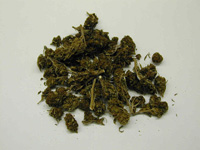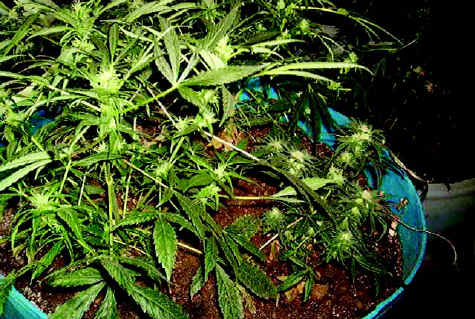Marijuana is the most frequently used illegal drug in the United States. It is a green, brown, or gray mixture of dried, shredded leaves, stems, seeds, and flowers of the hemp plant. It is called by numerous street names such as pot, herb, weed, grass, boom, Mary Jane, gangster, or chronic. There are also names for different strains or “brands” of marijuana, such as “Texas tea,” “Maui wowie,” and “Chronic.”
Most users roll loose marijuana into a cigarette (called a joint or a nail) or smoke it in a pipe. One well-known type of water pipe is the bong. Some users mix marijuana into foods or use it to brew a tea.
Another method is to slice open a cigar and replace the tobacco with marijuana, making what’s called a blunt. Some blunts include crack cocaine, a combination known by various street names, such as “primos” or “woolies.” Joints and blunts often are dipped in PCP and are called “happy sticks,” “wicky sticks,” or “love boat.” One book of American slang lists more than 200 terms for various kinds of marijuana.
Why do People use Marijuana?
Curiosity and the desire to fit into a social group are common reasons to use the drug. Certainly, youngsters who have already begun to smoke cigarettes and/or use alcohol are at high risk for marijuana use.
Research suggests that the use of alcohol and drugs by other family members plays a strong role in whether children start using drugs. Some young people who take drugs do not get along with their parents. Some have a network of friends who use drugs and urge them to do the same (peer pressure). All aspects of a child’s environment – home, school, neighborhood – help to determine whether the child will try drugs.
Young people who become more heavily involved with marijuana can become dependent, making it difficult for them to quit. Others mention psychological coping as a reason for their use – to deal with anxiety, anger, depression, boredom, and so forth. But marijuana use is not an effective method for coping with life’s problems, and staying high can be a way of simply not dealing with the problems and challenges of growing up.
Health Effects of The Drug
All forms of marijuana are mind-altering and it changes how the brain works. It contains THC (delta-9-tetrahydrocannabinol), the main active chemical in marijuana. It also contains more than 400 other chemicals. Marijuana’s effects on the user depend on it’s strength or potency, which is related to the amount of THC it contains. The THC content has been increasing since the 1970s.
 According to a recent report in USA Today and information from the Mexican Health Ministry, new patients at drug treatment centers quadrupled since 2000.
According to a recent report in USA Today and information from the Mexican Health Ministry, new patients at drug treatment centers quadrupled since 2000. Research shows that some teens are “self medicating” by using street drugs like marijuana to try and overcome feelings of depression. What they do not realize is that marijuana can actually compound the problem.
Research shows that some teens are “self medicating” by using street drugs like marijuana to try and overcome feelings of depression. What they do not realize is that marijuana can actually compound the problem. 